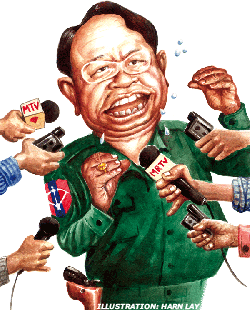
| By YENI | APRIL, 2006 - VOLUME 14 NO.4 |
Burmese Information Minister Brig-Gen Kyaw Hsan may appear outwardly to be a friend of the local press. But he also carries a big stick.
 Burmese Minister of Information Brig-Gen Kyaw Hsan seems to have a very busy schedule these days. But helping to channel real information to the Burmese masses doesn’t seem to be his main concern. If anything, it is to coax
Burmese Minister of Information Brig-Gen Kyaw Hsan seems to have a very busy schedule these days. But helping to channel real information to the Burmese masses doesn’t seem to be his main concern. If anything, it is to coax
Officially, his current schedule looks like this: Meet members of the Chinese Journalists Association from Beijing, led by chairman Shao Huaz; host Ronald Breggen, from the Dutch head office of New Skies Satellites, and his company’s Singapore-based Asia-Pacific sales director Matthew Oh, based in Singapore; and inspect the state-owned Myanma Radio and Television station on Rangoon’s Pyay Road. But more important, he has been lecturing chief editors of the state-owned newspapers, and reviewing his new media policy.
More ominously, he was meeting officials at
Kyaw Hsan as a personality cooperates with the press quite well. He holds press conferences and answers questions with smiles. He gets along well with some local editors and journalists. He has also allowed reporters to cover natural disasters, poverty and health issues, such as HIV/AIDS—which in Burma’s tightly-controlled environment were issues which were previously banned.
In the past, the regime’s semi-official The Myanmar Times had a special privilege to report some sensitive issues. But the privilege has now been spread to others.
The minister has also been involved in conducting recent journalism courses. Not surprisingly, he was also one of the lecturers. He has also been seen giving “guidance” to new recruits at the Union Solidarity Development Association, the junta’s mass organization.
But the thrust of his lectures and advice to journalists has been to “serve the interest of the state and the people,” and to report “on the successful implementation of the seven-point road map [to democracy] and convening of the National Convention successfully.” As the nation’s “dynamic and efficient media”… the browbeaten hacks were to “penetrate foreign countries.”
Nevertheless, some Rangoon-based journalists see the minister as a media savvy man, who has opened wider opportunities for local journalists to get information and data from the officials. Some well-known editors are known to have been thrilled at the unaccustomed privilege of being invited to attend official press briefings, and enjoying Kyaw Hsan’s Q and A sessions.
“He [Kyaw Hsan] is working hard,” notes a journalist in
This has led him recently to lecture editors of government-run dailies to change the style of news reporting and cover “more interesting news.” Under the minister’s new policy, daily papers have been reporting more entertainment and sports news. On TV, a new channel known as MRTV 4 has also been featuring more foreign films and comics.
Kyaw Hsan also knows only too well that Chinese and South Korean soap operas are quite popular with the population. So these soap opera and movies are screened around the same time as broadcasts by shortwave radio stations such as BBC, VOA and Radio Free Asia, beamed to
The results so far have been good for Kyaw Hsan. Many residents in
Some local editors might welcome Kyaw Hsan’s new media policy, but his attempt to interfere in
At the FCCM’s recent annual meeting, the minister wanted journalists who are close to him to be elected as central executive members. But they were voted out.
Kyaw Hsan seemed to be unhappy with the outcome. Then the minister reportedly responded that journalists members of the FCCM must adhere to the national interest and national causes. Otherwise, they would be punished.
Very well, sir, if you wish, we are ready to serve the interests of the state and people. But please remember what you once said in a speech: “The media should be free.”